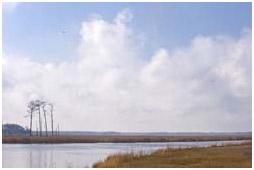Ecosystems and Air Quality

Research shows that air pollution may effect ecosystems. Air pollutants such as sulfur may lead to excess amounts of acid in lakes and streams, and can damage trees and forest soils. Nitrogen in the atmosphere can harm fish and other aquatic life when deposited on surface waters. Ozone damages tree leaves and negatively affects scenic vistas in protected natural areas. Mercury and other heavy metal compounds that are emitted into the air from fuel combustion and deposited on land and in water accumulates in plants and animals, some of which are consumed by people.
EPA Research shows ecological impacts of air pollutants and supports the National Ambient Air Quality Standards (NAAQS), which provide public welfare protection, including protection against decreased visibility and damage to animals, crops, vegetation, and buildings. Research includes development of deposition modeling tools, as well as measuring and quantifying air pollution emissions and precursor pollutants (e.g., ammonia), and pollutant deposition on ecosystems.
Related Resources
- Global Change Impacts and Adaptation Publications
GCRP publications for a specific discipline or research area. - Integrated Science Assessments (ISAs)
Integrated Science Assessments (ISA) are reports that represent a concise evaluation and synthesis of the most policy-relevant science for reviewing the National Ambient Air Quality Standards (NAAQS). - National Ambient Air Quality Standards (NAAQS)
The Clean Air Act requires EPA to set National Ambient Air Quality Standards (NAAQS) for wide-spread pollutants from numerous and diverse sources considered harmful to public health and the environment. - Report on the Environment: Ecological Condition Topic
Critical ecosystem characteristics that are affected simultaneously by stressors in multiple media.
